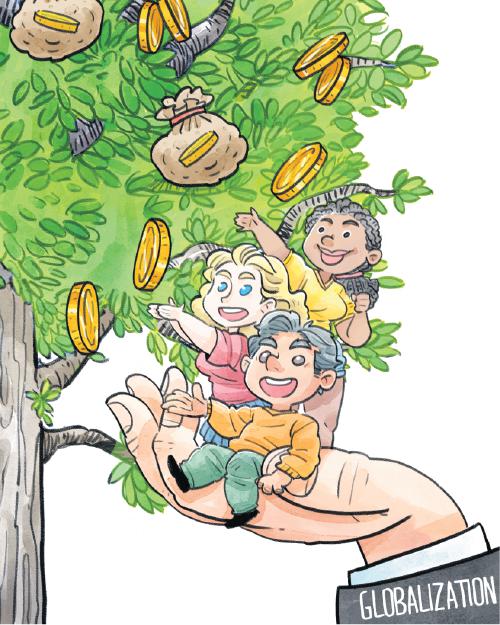First remove the log from your own eye


Americans are now blaming a host of social ills-stagnant wages, de-industrialization, inequality-even obesity and drug addiction-on globalization. More to the point, politicians and pundits of all stripes are blaming China. But most of the bad stuff that has happened in the US economy has little to do with globalization or China. Instead, it is caused by bad domestic economic policies followed over the last 30 years.
Globalization has benefited China, but the nation's spectacular long-term growth was largely made possible by systematic market and institutional reforms combined with massive investment in infrastructure, education, and productive industrial capital since the beginning of reform and opening-up in 1978. Fairly open access to international markets has facilitated this process, but the key has been the reform and investment.
Many of the benefits and problems attributed to globalization are, in fact, the result of either good or bad domestic policies.
Over the past 30 years or so, the United States has turned over much of its economy to a few large politically-connected financial companies and more and more of the economy has been taken over by monopolistic or oligopolistic firms. Of course, inequality rose as wealth flowed toward this in-group and away from average people.
As the US financial system deregulated, more than half of the local banks that had financed local companies went out of business-either by failing or by being absorbed into a few big banks. Actually, deregulation is the wrong word: the big banks were allowed to compete nationally, but many new regulations and reporting requirements were so expensive that small local banks could not cover the legal or information technology costs.
The Federal Reserve's strategy of continually goosing the economy with a very low interest rate policy (VLIRP) combined with deregulation of the market for deposits, made it impossible for banks to follow the old business model of borrowing from depositors to lend to steady companies that were investing in the real economy. Little money was to be made by lending to productive, normal companies. So, banks and other financial firms developed business models based on consumer lending, often to nearly insolvent consumers, and betting on a few internet-based superstar firms that were aiming to seize monopoly profits.
Large internet-based firms that had preferential access to capital drove the local companies, which had been the heart of the American system, out of business. For example, Amazon lost money for over 20 years. It did not pay corporate income taxes during that time. (And it also did not pay state sales taxes for many years.) No local store could compete with that.
In this era of financialization, company executives, who had previously been engineers or product experts, were largely replaced by financiers or people with political influence. It is not surprising that the Boeing 737-Max fiasco happened at a time when the company did not have a single engineer on its board of directors.
Average families were stressed by soaring costs of healthcare and education caused by a weird system of unaccountable public-private quasi-monopolistic institutions that have no incentive to control costs. For example, the student loan program, created in the late 1970s, may have been intended to help university students, but its real effect has been to create a massive pool of money that could be grabbed by the universities, allowing them to get huge increases in tuition costs. The current crisis of indebtedness of young Americans is the result.




































